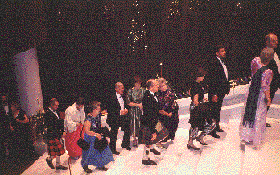CONTACT US
|
ADVERTISING INFO
© 1996-2013 Asian Media Group Inc
No part of the contents of this site may be reproduced without prior written permission.
HONG KONG, TESTOSTERONE &
BIRTH OF THE ASIAN CENTURY
PAGE 2 OF 8
| The U.S. was one of a handful of western bullies that kicked around China, the helpless fatboy, between 1849 and 1929. |
 he next few years will see the flowering of many international
grudge matches--ballsgames, if you will--including those between
Japan and China, Japan and Corea, and Japan and Russia. What but
testosterone can explain Japan's insistence on stoking old grudges by
asserting claims to uninhabited rocks in waters shared with its three nearest
neighbors? Its main World-War-II ally Germany defused neighbors'
resentment by renouncing nationalism--read testosterone--in its dealings.
While not yet a balls-out player on the international scene, during the last
decade Japan showed a testosterone spurt in its high-profile overseas
investments, many clearly motivated by ego more than financial calculation.
Corea, too, is feeling its oats, pushing its auto, electronics and construction
giants to charge into Russia, China, Eastern Europe, Southeast Asia, Africa, the
Middle East, South America and the U.S. Armed with $90 billion in foreign
reserves and a powerful consumer electronics export machine, Taiwan has
entered overseas diplomatic and business initiatives on a massive scale that
belies its population of 23 million. Its ambition is to win recognition as a
global economic power on a par with its giant mainland rival.
he next few years will see the flowering of many international
grudge matches--ballsgames, if you will--including those between
Japan and China, Japan and Corea, and Japan and Russia. What but
testosterone can explain Japan's insistence on stoking old grudges by
asserting claims to uninhabited rocks in waters shared with its three nearest
neighbors? Its main World-War-II ally Germany defused neighbors'
resentment by renouncing nationalism--read testosterone--in its dealings.
While not yet a balls-out player on the international scene, during the last
decade Japan showed a testosterone spurt in its high-profile overseas
investments, many clearly motivated by ego more than financial calculation.
Corea, too, is feeling its oats, pushing its auto, electronics and construction
giants to charge into Russia, China, Eastern Europe, Southeast Asia, Africa, the
Middle East, South America and the U.S. Armed with $90 billion in foreign
reserves and a powerful consumer electronics export machine, Taiwan has
entered overseas diplomatic and business initiatives on a massive scale that
belies its population of 23 million. Its ambition is to win recognition as a
global economic power on a par with its giant mainland rival.
The biggest and most spectacular ballsgame, however, will be between the U.S. as the west's champion and China as Asia's dominant power. Natural human tendency toward racial competition and trade issues like China's huge and growing trade surplus and lack of cooperation in protecting intellectual property rights are certainly enough to produce some conflict. The really dangerous friction, however, is on the hormonal level. Beijing's bosses have come to believe that U.S. leaders are contemptuous of China's sovereignty and importance as a global power. That resentment is further fueled by angry memories of the last 150 years of history.
The U.S. was one of a handful of western bullies that kicked around China, the helpless fatboy, between 1849 and 1929. U.S. Marines slaughtered Chinese in the Boxer Rebellion. With the various Alien Exclusion Acts designed mainly to curb Chinese immigration, the U.S. put its racist sentiments on display.

A scene from the final days of the British empire -- guests arriving for the St Andrew's Ball
The old grudge became an active rivalry when China stepped in to
fight the U.S. to a stalemate on the Corean peninsula and helped Ho Chi Minh
expel the U.S. from Vietnam. The fact that the U.S. is China's most important
trading partner and China is the U.S.'s second biggest--and arguably most
important--trading partner only adds to the emotional charge. Americans
love well-made shoes, sports shirts and electronics at 1976 prices and
appreciate the fact that the output of Chinese factories keeps our inflation
rate at a reassuring 2%. Without Chinese imports it would probably jump to a
painful 8.5%. And without American consumers, China would lose 37% of its
export market--fully 10% of its gross domestic product--and its economic
boom would bust overnight.
Neither side wants a shooting war. But both want to project their
willingness, not to say eagerness, to stand toe-to-toe and trade punches if the
occasion arises--in short, to prove their manhood. History has put a chip on
the shoulders of both nations.
Usually the ballsgame is less overt. The U.S. complains about China's
so-called human rights violations, knowing full well that it's meddling in
China's internal affairs. China tells the U.S. to stop meddling. The U.S. extends
China's most-favored-nation trading status. China releases a few dissidents.
Certain interests are mollified in both nations. The game lets both sides work
off testosterone while preserving bread-and-butter trade relations.
PAGE 3
| PAGE 1 | 2 | 3 | 4 | 5 | 6 | 7 | 8 |
